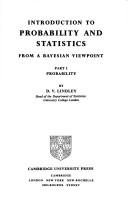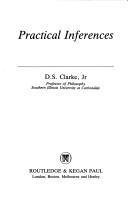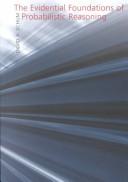| Listing 1 - 10 of 4262 | << page >> |
Sort by
|
Periodical
Year: 2007 Publisher: [Canterbury] : University of Kent
Abstract | Keywords | Export | Availability | Bookmark
 Loading...
Loading...Choose an application
- Reference Manager
- EndNote
- RefWorks (Direct export to RefWorks)
Reasoning --- Inference --- Inférence (Logique)
Book
ISBN: 9781482222234 148222223X 9780367576011 Year: 2015 Publisher: Boca Raton, FL : Chapman & Hall/CRC,
Abstract | Keywords | Export | Availability | Bookmark
 Loading...
Loading...Choose an application
- Reference Manager
- EndNote
- RefWorks (Direct export to RefWorks)
Inference. --- Biometry. --- Inférence. --- Biométrie.
Book
Year: 1965 Publisher: Cambridge: Cambridge university press,
Abstract | Keywords | Export | Availability | Bookmark
 Loading...
Loading...Choose an application
- Reference Manager
- EndNote
- RefWorks (Direct export to RefWorks)

ISBN: 0521298679 9780521298674 Year: 1965 Publisher: Cambridge: Cambridge university press,
Abstract | Keywords | Export | Availability | Bookmark
 Loading...
Loading...Choose an application
- Reference Manager
- EndNote
- RefWorks (Direct export to RefWorks)
Book
ISBN: 9780874627657 Year: 2009 Publisher: Milwaukee Marquette university press
Abstract | Keywords | Export | Availability | Bookmark
 Loading...
Loading...Choose an application
- Reference Manager
- EndNote
- RefWorks (Direct export to RefWorks)
Inference --- Metaphysics
Book
ISBN: 9780300255881 0300255888 Year: 2021 Publisher: New Haven, Connecticut : Yale University Press,
Abstract | Keywords | Export | Availability | Bookmark
 Loading...
Loading...Choose an application
- Reference Manager
- EndNote
- RefWorks (Direct export to RefWorks)
An accessible and contemporary introduction to the methods for determining cause and effect in the social sciences Causal inference encompasses the tools that allow social scientists to determine what causes what. Economists—who generally can’t run controlled experiments to test and validate their hypotheses—apply these tools to observational data to make connections. In a messy world, causal inference is what helps establish the causes and effects of the actions being studied, whether the impact (or lack thereof) of increases in the minimum wage on employment, the effects of early childhood education on incarceration later in life, or the introduction of malaria nets in developing regions on economic growth. Scott Cunningham introduces students and practitioners to the methods necessary to arrive at meaningful answers to the questions of causation, using a range of modeling techniques and coding instructions for both the R and Stata programming languages.
Causation. --- Inference.
Multi
ISBN: 9781107049796 9781107279186 9781107628168 Year: 2015 Publisher: Cambridge Cambridge University Press
Abstract | Keywords | Export | Availability | Bookmark
 Loading...
Loading...Choose an application
- Reference Manager
- EndNote
- RefWorks (Direct export to RefWorks)
"Inferencing is defined as 'the act of deriving logical conclusions from premises known or assumed to be true', and it is one of the most important processes necessary for successful comprehension during reading. This volume features contributions by distinguished researchers in cognitive psychology, educational psychology, and neuroscience on topics central to our understanding of the inferential process during reading. The chapters cover aspects of inferencing that range from the fundamental bottom up processes that form the basis for an inference to occur, to the more strategic processes that transpire when a reader is engaged in literary understanding of a text. Basic activation mechanisms, word-level inferencing, methodological considerations, inference validation, causal inferencing, emotion, development of inferences processes as a skill, embodiment, contributions from neuroscience, and applications to naturalistic text are all covered as well as expository text and online learning materials, and literary immersion"--

ISBN: 0710204159 Year: 1985 Publisher: London Routledge
Abstract | Keywords | Export | Availability | Bookmark
 Loading...
Loading...Choose an application
- Reference Manager
- EndNote
- RefWorks (Direct export to RefWorks)
Inference --- Inférence (Logique) --- Ampliative induction --- Induction, Ampliative --- Inference (Logic) --- Reasoning --- Inference. --- Inférence (Logique)
Book
ISBN: 9780415394222 9780815371984 9781315771601 9781317675877 9781317675884 9781317675891 0415394228 0815371985 1315771608 Year: 2015 Volume: 15 Publisher: London Routledge
Abstract | Keywords | Export | Availability | Bookmark
 Loading...
Loading...Choose an application
- Reference Manager
- EndNote
- RefWorks (Direct export to RefWorks)
"In this book, Reiss argues in favour of a tight fit between evidence, concept and purpose in our causal investigations in the sciences. There is no doubt that the sciences employ a vast array of techniques to address causal questions such as controlled experiments, randomized trials, statistical and econometric tools, causal modeling and thought experiments. But how do these different methods relate to each other and to the causal inquiry at hand? Reiss argues that there is no "gold standard" in settling causal issues against which other methods can be measured. Rather, the various methods of inference tend to be good only relative to certain interpretations of the word "cause", and each interpretation, in turn, helps to address some salient purpose (prediction, explanation or policy analysis) but not others. The main objective of this book is to explore the metaphysical and methodological consequences of this view in the context of numerous cases studies from the natural and social sciences"--

ISBN: 0810118211 9780810118218 9780810118218 0810118211 Year: 2001 Publisher: Evanston (Ill.): Northwestern university press,
Abstract | Keywords | Export | Availability | Bookmark
 Loading...
Loading...Choose an application
- Reference Manager
- EndNote
- RefWorks (Direct export to RefWorks)
No matter how irrefutable it may seem, evidence is often a matter of interpretation. Incomplete, inconclusive, imprecise, or vague, it is nonetheless the basis of myriad everyday conclusions and decisions. In this authoritative work, David A. Schum develops a general theory of evidence as it is understood and applied across a broad range of disciplines and practical undertakings. Synthesizing insights from law, philosophy and logic, probability, semiotics, artificial intelligence, psychology, and history, Schum provides a detailed examination of the various properties and uses of evidence and the evaluative skills evidence requires. Along with the evidential subtleties of probabilistic reasoning, Schum also explores the processes by which evidence is generated or discovered and looks at the intellectual and practical underpinnings of probabilistic reasoning. It is a useful resource for students, researchers, and practitioners of every discipline concerned with evidence and its inferential use.
Probabilities --- Evidence --- Inference
| Listing 1 - 10 of 4262 | << page >> |
Sort by
|

 Search
Search Feedback
Feedback About UniCat
About UniCat  Help
Help News
News